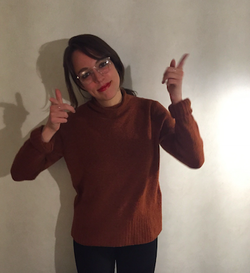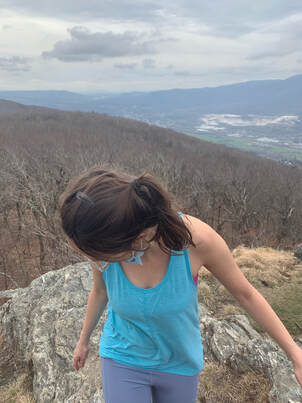
Hi, I'm Becca. I am the non-fiction book critic of the Washington Post, an editor at The Point, and a contributing editor at The Boston Review . My essay collection, All Things Are Too Small, was published Metropolitan Books in the US and Virago in the UK in April 2024. The New York Times called it "splendidly immodest" and "exhilarating" and The Guardian called it "bracing and brilliant." It was a New York Times editors' pick and a New Yorker weekly recommendation. Finally, I am also a PhD candidate (on indefinite hiatus) in philosophy at Harvard, but i remain perhaps delusionally convinced that someday I will finish my dissertation. These days I live in Washington, DC, with this person, whom I love. Here you can find all of my Washington Post pieces, which will come out each week, generally speaking.
To keep up with my writing/rantings, subscribe to my substack here. As a writer: I have contributed essays, book reviews, and the occasional art review to publications like The TLS, The Nation, The New York Times Book Review, The New Yorker, The Atlantic, Liberties, Bookforum, Art in America, The Yale Review, The Baffler, and more. These days, I write mostly for the Washington Post about non-fiction, but occasionally I write essays on fiction and whatever else for other venues. I am the winner of the first annual Robert B. Silvers Prize for Literary Criticism (see more here) and the 2023 Nona Balakian Citation for Excellence in Reviewing (see more here). In 2017, I was a finalist for a National Magazine Award in the essays/criticism category. A few authors I especially love are Joseph Roth, Italo Svevo, Henry James, Henry Green, Heinrich von Kleist, Marie de France, and Norman Rush. My agent is Anna Sproul-Latimer of Neon Literary. As a (lapsed?) philosopher: I am primarily interested in aesthetics (especially aesthetic value and its relationship to other types of value), the philosophy of love and sex, and the history of German philosophy, especially Martin Heidegger, although I have increasingly consuming secondary interests in political philosophy. In "The Good, the Bad, and the Ugly," published in The British Journal of Aesthetics, I defend aestheticism, the view that aesthetic value is sometimes a partial grounds of moral value. I describe aestheticism in more detail in a chapter in the Oxford Handbook of Ethics and Art. If I ever get around to completing it, my dissertation will be about some combination of the following: what it is to be a beautiful person, why evolutionary psychologists are wrong about human beauty, the ethics of exclusionary romantic/sexual/aesthetic preferences, and what role the state should play in ameliorating inequitable distributions of intimate "goods." I hold a first-class MPhil in the history and philosophy of science from the University of Cambridge and a B.A., summa cum laude with high honors, from Dartmouth College, where I studied philosophy & German (and cultivated an enduring distaste for fraternities). I receive many emails asking for advice about graduate school applications. I have answered some frequently asked questions on this page. As I note there, I do not consider myself an expert in how to write a successful graduate school application, and I urge all prospective grad students to consult resources online, as well as supervisors who have served on admissions committees, rather than me! Before the pandemic, I followed Hegel in regarding nature as geistlos, but now, like any good Heideggerian, I am a big fan of hiking. Here I am in the Berkshires, which I love
|
|
THE CLOSEST THING I HAVE TO AN INVIOLABLE PRINCIPLE is that it is a sacrilege to read a good book on a screen. Setting aside paper’s many sentimental attractions (gluey smell, physical heft, ample space for scribbling), to which I will admit I am susceptible, to read on what is so hideously called an “e-reader” is to concede that literature is continuous with the internet, that non-place where people go to look up one word, only to resurface lifetimes later, dazed and dead-eyed, twenty minutes into a video of someone popping pimples with a special implement. The internet scoops out the mind and mashes it into wet pulp, which is to say that it is the opposite of a novel, at least when the novel is working.
But the task of literature is to reflect (if never just replicate) even unliterary or anti-literary realities, on pain of irrelevance. Contemporary fiction full of telegrams and analog phones would smack of contrivance and cutesy nostalgia, like TV shows in which the characters show up at each other’s houses to stage confrontations in person, instead of just texting angry emojis as actual people increasingly do. The internet is real life now. The question is not whether to fictionalize it but how to incorporate its distractions and derangements into a novel that is not hellish to read. Read more here.
0 Comments
The most offensive thing about Pandemic!, Slavoj Žižek’s hastily composed monograph, is that it is not especially offensive. Despite its cover (outfitted in shrieking magenta, with five of the title letters enlarged to spell out “panic”), its outrageous chapter names (“The Virus of Ideology”, etc) and its sensationalist subtitle (“COVID-19 shakes the world”), the Slovenian provocateur’s latest publication is uncharacteristically staid. Read more here.
|
Archives
June 2022
Categories |

 RSS Feed
RSS Feed